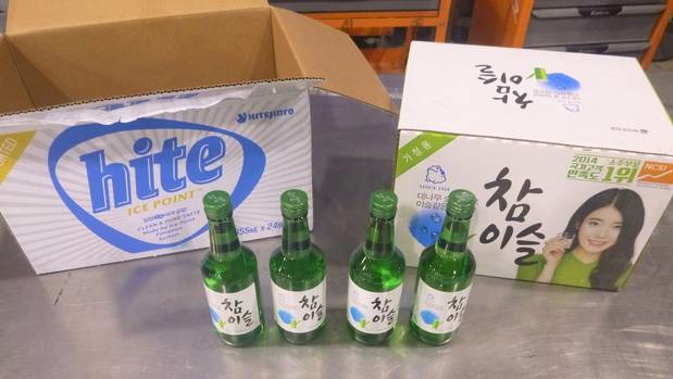
It sounds like a tale of Prohibition-era bootleggers.
Like when mobsters Al Capone and Lucky Luciano used speedboats to whizz Canadian whisky across the Great Lakes and Jamaican Rum through the Florida Keys into dry 1920s America.
But it's a local, modern story of underground booze barons smuggling hard liquor into New Zealand hidden deep inside shipping containers, putting the lives of Kiwi drinkers at risk.
And instead of doing it to appease thirsty Kiwis, deprived of their tipple of choice during a dry period, the rum-runners are avoiding millions in tax duty.
They are using multiple passports, fake identities, and dodgy paper trails to sneak alcohol into the country.
Moonshiners are then selling the smuggled grog cut-price into liquor stores, and to a lesser degree, into restaurants, industry insiders have told the Herald on Sunday.
"The scale of this is becoming more and more alarming and the topic of illicit alcohol is coming up again and again [with members]," says the aptly named Robert Brewer, chief executive of Spirits New Zealand, the national trade organisation representing producers, distributors, brand owners, importers and exporters of premium spirits and spirit-based drinks.
The liquor industry estimates the black market is costing New Zealand around $40 million annually in evaded taxes.
Customs officials accept it's "probably" happening. They haven't seen a marked recent increase but investigations manager Bruce Berry admits: "We physically can't get people on the ground to look at containers without grinding our economy to a halt."
Spirits New Zealand is now set to launch a "special project" which, it says, will properly investigate the scale of smuggling.
/arc-anglerfish-syd-prod-nzme.s3.amazonaws.com/public/UNGFXUEA3BF6RI253A342PYIJE.jpg)
Bruce Berry, Customs investigations manager. (Photo / Tania Whyte)
It's surveying its members and welcoming tip-offs of under-handed operators that it says it will pass on to Customs and the Ministry for Primary Industries (MPI).
"We'll be gathering information from the eyes and ears that we have on the ground in terms of product that raises one of those red flags. The price point at which some of these products go to market are significantly less than what legitimately imported product was going to market at," Brewer says.
Both MPI and Customs say they welcome any industry-intelligence and will work with the assisting parties to stamp out smugglers.
Importers first suspected questionable trading after spotting bottles on Auckland shelves that they knew, if brought here legitimately, would have to be sold at a loss.
Rumours started swirling about restaurants importing containers of rice, but stacking the shipment with pallets of beer and spirits, and only declaring the foodstuffs – saving tens of thousands of dollars in liquor duties.
The duty/GST on a six-pack of 5% abv beer is $4.74, while it's $8.45 for a bottle of French champagne and $32.81 for a 1125ml bottle of whisky, bourbon or vodka.
Soon, small-time liquor-store owners were driving around in flash cars.
"It's easy money. I've had guys say they can't believe how easy it is to rip off the system here in New Zealand," one importer told the Herald on Sunday.
"With a 20ft [6m] container full of, say, whisky, bourbon, or vodka, it should cost anywhere between $150,000 and $250,000 in duty. But they under-declare what is in the container and pay a fraction - perhaps 10-20 per cent of the duty - and clear off with the rest. They're then selling it for less than what we can buy it directly from the distillery for."
The sellers are in on it. They fudge invoices, hide behind language barriers, and help package containers that are sent here from hubs across the world: Eastern Europe, South America, Asia and the Sub-continent.
Customs rely heavily on data analytics as a risk-management tool to spot ill trends and crooks conning the system.
Customs have taken out two major prosecutions in recent years. One involving illicit beer imports and, in 2014, investigating businessman Jun Lee after intelligence raised red flags over a change in his importation pattern.
The lengthy probe found that 36-year-old Lee, shadow director of Auckland-based company Youngs NZ International Limited, was using double invoices when declaring shipments of the Korean beer, Hite.
/arc-anglerfish-syd-prod-nzme.s3.amazonaws.com/public/AH7NHV7BCNGO3KO24JFKS4CIZE.jpg)
50 containers said to contain only South Korean beer Hite actually contained 22,800 bottles of soju. (Photo / Supplied)
Customs officials searched several of his containers. They found the front row of each Hite-labelled box contained beer, but the remaining boxes were actually chockful of Korea's national drink, the spirit soju, which had a much higher duty.
Lee had managed to ghost in 50 containers from South Korea over a four-year period, at a staggering 22,800 soju bottles per shipment amounting to more than one million bottles, and underpaying duty and GST by $4 million.
Last October at Auckland District Court, he was jailed for three-and-a-half years, with Customs saying: "Misdeclaring, concealing goods or using under-valued invoices is a serious offence that Customs can investigate. We may not take immediate steps as we gather evidence of systematic fraud, but perpetrators can expect to be prosecuted."
Liquor industry players spoken to by the Herald on Sunday fear Lee was an unlucky anomaly.
A major Auckland-based importer, speaking on condition of anonymity, believes smuggling is rife, getting worse, and driving the proliferation of licences for tiny round-the-clock liquor stores.
"This is how they survive," he says.
"It's happening, we all know it's happening, and while parallel importing isn't illegal, illegal labelling and under-declaring are. And when it comes to alcohol, and spirits in particular, it's only time until someone is killed. That's why it needs to be stamped on."
There are stories about individuals landing under-declared containers every week.
"Guys are becoming millionaires overnight," one importer says.
He described a recent encounter with a visiting distributor from one of India's biggest liquor companies.
"He was going around and seeing everybody, including liquor store owners and legitimate importers like me, and saying, 'This is what I can do.' He said, 'We can provide you with product and we can arrange invoicing as you want it. We can doctor alcohol content, volumes, we'll doctor whatever you want.' He was not in the least bit embarrassed. We're like babes in the woods when it comes to these guys."
Another gave an example of buying an expensive tequila direct from the manufacturer, only to see other outlets selling it cheaper than their landed costs.
"Tell me how that works," the bewildered importer says.
Fake vodka with high levels of methanol has killed people and caused blindness across Europe over the past 12 years.
Regions in Russia – where the country's relationship with vodka approaches mystical levels – have at times declared states of emergency after deaths and hospitalisations from counterfeit vodka.
Parallel importing is legal.
The Ministry of Business, Innovation and Employment says it allows retailers, wholesalers and other parties to "obtain goods subject to intellectual property rights directly from licensed or authorised overseas sources, rather than dealing with local suppliers, licensees or agents".
"In doing so, parallel importing allows for competition between sources of the same or similar goods," MBIE says.
However, parallel-imported booze must comply with New Zealand regulations, including requirements of the Biosecurity Act 1993, Food Act 2014, Food Regulations 2015 and Importing Food Notice.
/arc-anglerfish-syd-prod-nzme.s3.amazonaws.com/public/5JORXROUBVG7HBWJWOKYEZKEE4.jpg)
Prohibition agents confiscate barrels of wine on the streets of New York City. (Photo / Getty Images)
For consumer information and traceability requirements, both locally produced and imported liquor for sale in New Zealand have to feature the Australia New Zealand Food Standards Code.
For a bottle of spirits, English-language information must include beverage name, lot code, alcohol by volume, number of standard drinks, net contents, physical address in New Zealand (or Australia) of the supplier or importer, including parallel importer, and any allergen labelling.
The Ministry for Primary Industries says it chases reports of non-compliance, and action can include educational advice, re-labelling, product recall or seizure, and prosecution.
"MPI's approach in responding to non-compliance is risk based, graduated and proportionate, and is focused on generating compliance," a spokeswoman said.
But despite the liquor industry's concerns, MPI and Customs aren't aware of a recent rise in smuggling or concerns over parallel importing.
Most imported beer, wine or spirits are "unlikely to have increased public health or safety risks" and would be comparable with locally produced products, the MPI spokeswoman said.
"It would depend on the nature of the non-compliance," she said.
"For instance, if there was no declaration of the alcohol content, this would present a risk, as would the presence of undeclared allergens."
According to latest Bloomberg Global Vice Index figures, New Zealand is the second most expensive country in the world to buy illicit drugs, as well as cigarettes and alcohol.
Benjamin Franklin once wrote there was nothing certain in this world except for death and taxes. He omitted another surety: booze smuggling.
"If you go back into the history of customs administrations worldwide, they have all started off as revenue and tax collections on behalf of government, the vast majority of the products being imported and smuggled were alcohol and tobacco," Customs NZ's Bruce Berry says.
"This is all about trying to beat the system. It's trade-based money laundering, to some extent, where they're trying to move money to make profit. The commodity aside, if people can make money on it, they will try and make money on it. Organised crime will start to move into these fields; we've seen that in tobacco products, where the tax now makes them a lucrative black market entity."
In the US, organised bootlegging by mafia groups emerged in response to Prohibition, which ran from 1920 to 1933.
It is often reported that it allowed a black market for alcohol and a financial basis for organised crime to flourish.
/arc-anglerfish-syd-prod-nzme.s3.amazonaws.com/public/IIF3XGQV4REZRLTORY7F3BEC3E.jpg)
American prohibition-time gangster Al Capone. (Photo / Getty Images)
Gangster Al Capone's multi-million dollar Chicago Outfit, which dealt in bootlegging, prostitution and gambling, dominated the organized crime scene.
In New Zealand, four referendums on introducing Prohibition failed in the early 1900s. The Depression and war years effectively ended the movement.
A 6pm closing hour for pubs and Sunday closing stayed in place until October 1967 when it was extended to 10pm.
Since 2013/14, there's been an average of 266 seizures of alcohol at the New Zealand border every year, according to Customs figures obtained by the Herald on Sunday. Most of that involves small quantities involving travelers stopped at airports.
While Customs and MPI haven't seen a rising trend in large-scale smuggling, they both welcome any tip-offs or information on suspected rogue operators.
New Zealand drinks giant Lion has some concerns around parallel importing but its major concern is illegal importation, particularly of spirits, and the corresponding health and safety fears that come with it.
"Unfortunately, you cannot guarantee the authenticity of product that enters the country illegally," a Lion spokeswoman said.
"This is a global issue and the industry is currently undertaking work to try and ascertain its scale in New Zealand and will work with MPI and Customs once they know more."
Take your Radio, Podcasts and Music with you









